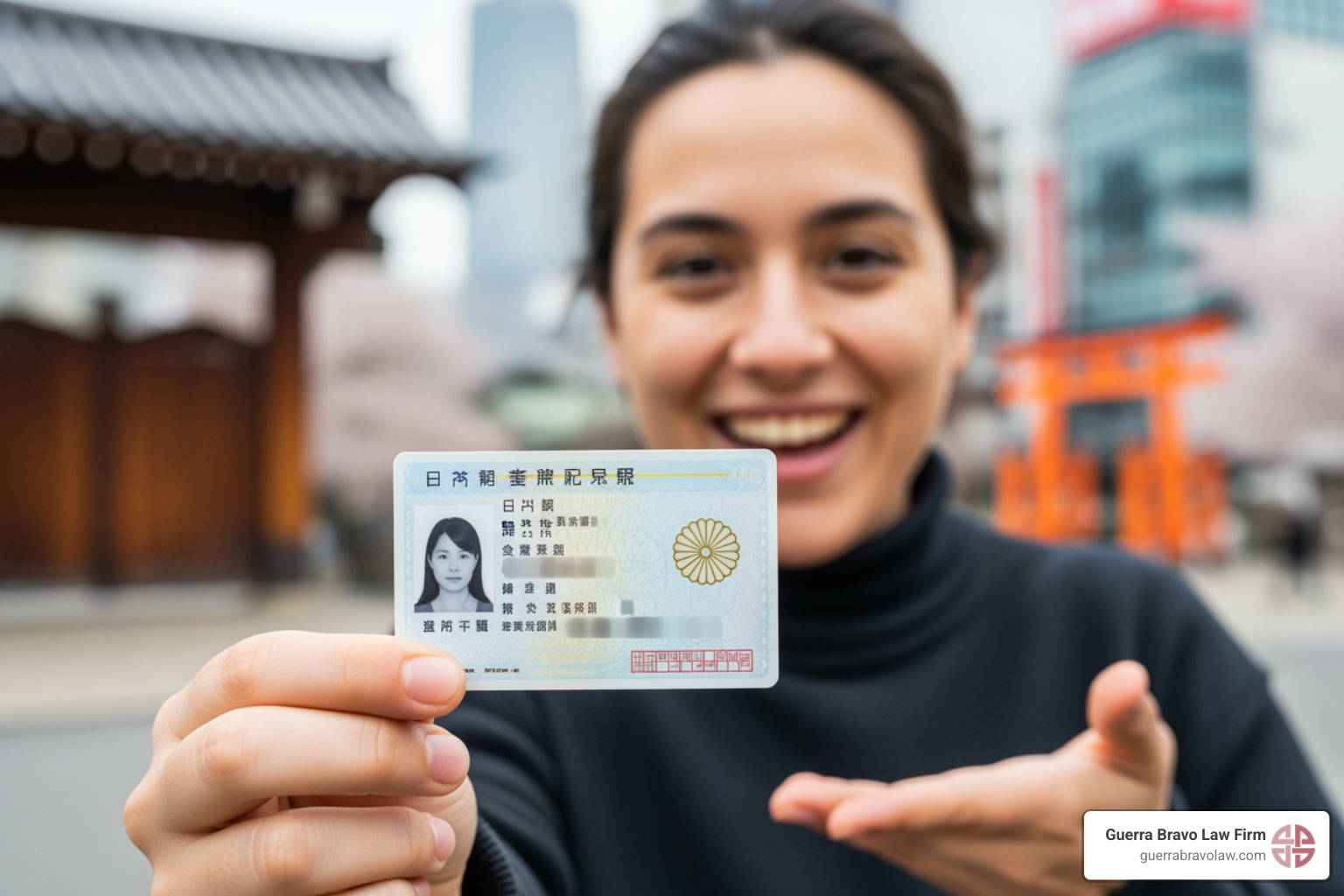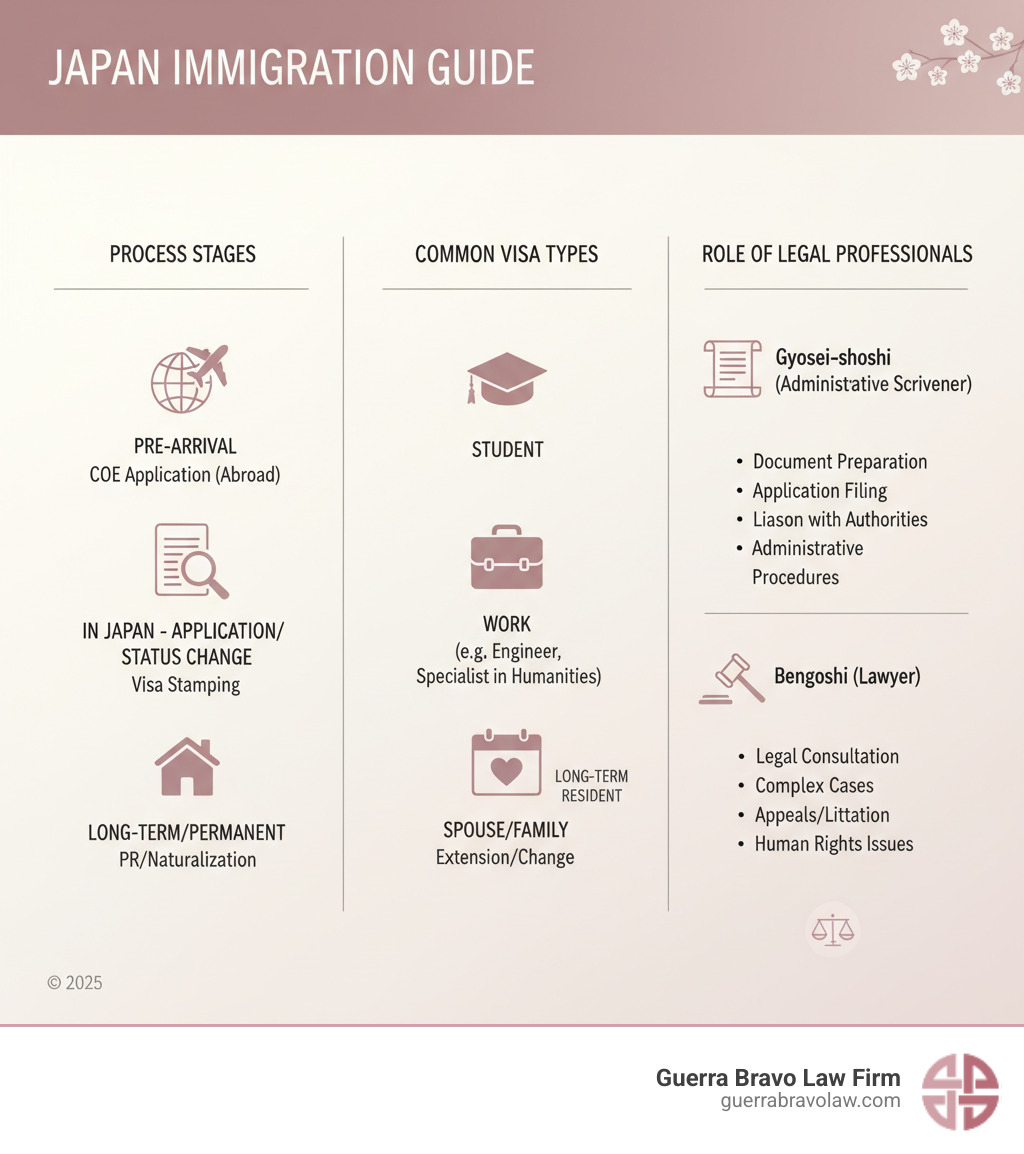
Finding Your Legal Samurai: A Guide to Japanese Immigration Lawyers
Why Understanding International Immigration Systems Matters for South Texas Residents
For residents of McAllen, Brownsville, Edinburg, and throughout the Rio Grande Valley, understanding international immigration systems provides valuable perspective on immigration law complexities worldwide. Whether you're a dual citizen, have family abroad, or are considering international business ventures, knowing how other countries handle immigration helps you appreciate the importance of expert legal guidance - both abroad and here at home.
This educational guide examines Japan's immigration system as a case study to illustrate universal immigration law principles that apply whether you're navigating systems in Tokyo or Texas. For our South Texas community - including residents of Harlingen, Mission, Pharr, Weslaco, Mercedes, Alamo, San Juan, Donna, Hidalgo, Palmview, La Joya, and Penitas - this knowledge is particularly relevant if you have connections to Japan through family, business, or future plans.
In Japan, Japanese immigration lawyers are professionals who guide foreign nationals through visa applications and residence permits. The system uses two distinct specialists:
Gyosei-shoshi (行政書士): Administrative scriveners who handle paperwork for routine visa applications, renewals, and permanent residency filings
Bengoshi (弁護士): Licensed attorneys-at-law who represent clients in court for complex legal disputes, appeals, and deportation defense
This dual-professional system offers important lessons for understanding immigration law anywhere. Just as Japan's "Status of Residence" system strictly defines permitted activities, the U.S. immigration system has its own complex requirements and restrictions. Whether you're a Rio Grande Valley resident with Japanese business interests, family connections to Japan, or simply seeking to understand immigration law better, these insights help illustrate why professional legal guidance is crucial.
Guerra Bravo Law Firm focuses exclusively on U.S. immigration law for our South Texas clients. However, we regularly coordinate with trusted international professionals when our clients have cross-border needs. This collaborative approach ensures you receive comprehensive support for both your U.S. immigration matters and any international considerations that may affect your case.
Understanding Japan's Legal Professionals: Bengoshi vs. Gyosei-shoshi
In Japan's legal system, two distinct professionals handle immigration matters: the Bengoshi (attorney) and the Gyosei-shoshi (administrative scrivener). Think of one as a courtroom litigator and the other as a bureaucratic specialist. Knowing which one you need is essential for a successful outcome.
Bengoshi (弁護士) - The Attorney-at-Law
A Bengoshi is a fully licensed attorney in Japan, similar to an attorney-at-law in the United States. Their legal authority is comprehensive, covering civil, criminal, and administrative law. Crucially, they are the only professionals authorized to represent clients in court.
When to Hire a Bengoshi:
A Bengoshi is necessary for any situation involving a legal dispute. Their role is critical in these scenarios:
Deportation or Removal Proceedings: If you are facing removal from Japan, you need a Bengoshi to represent you in immigration court. This is analogous to how our firm provides removal defense for clients facing deportation in the U.S.
Court Appeals: While a Gyosei-shoshi can help you re-apply after a rejection, only a Bengoshi can file a formal appeal to challenge the decision in court.
Criminal-Immigration Cases ("Crimmigration"): If you face criminal charges in Japan, a Bengoshi is vital to manage the case and mitigate any negative impact on your immigration status.
Complex or Unusual Cases: A Bengoshi's broad legal training allows for creative strategies that administrative specialists cannot offer.
Gyosei-shoshi (行政書士) - The Administrative Scrivener
A Gyosei-shoshi is a certified specialist in administrative procedures. They are experts at preparing and filing documents with Japanese government agencies, acting as a bridge between you and the bureaucracy.
Role and Scope:
Gyosei-shoshi specialize in knowing the exact requirements for government paperwork. Many focus exclusively on immigration, developing deep expertise in visa applications, status changes, and residency procedures. Their primary limitation is that they cannot represent clients in court or handle contested legal disputes.
When to Hire a Gyosei-shoshi:
A Gyosei-shoshi is the most efficient and cost-effective choice for straightforward administrative tasks:
Standard Visa Applications and Renewals: For work, student, or dependent visas, they ensure all forms are completed and submitted correctly.
Changing Status of Residence: They routinely handle the paperwork for transitions, such as from a student to a work visa.
Certificate of Eligibility (COE): They expertly manage this crucial pre-application process required for most long-term visas.
Permanent Residency and Naturalization: These applications are document-intensive administrative processes, which is a Gyosei-shoshi's specialty.
Business Incorporation: They can assist with the administrative side of setting up a company in Japan.
Core Services Offered by Japanese Immigration Lawyers and Specialists
Japanese immigration professionals offer a spectrum of services covering a foreigner's entire lifecycle in Japan, from initial entry to long-term settlement.

Visa Application and Status of Residence Management
Your visa, or "Status of Residence," is your lifeline in Japan. Professionals ensure it's obtained and managed correctly.
Certificate of Eligibility (COE): This is a pre-approval from Japan's Immigration Bureau, essential for most long-term visas. A lawyer or Gyosei-shoshi handles the application on your behalf, streamlining the process.
Work Visas: Japan offers various work visas (e.g., Engineer, Specialist in Humanities, Intra-company Transferee). Professionals guide you and your employer through the specific requirements for each category. For similar needs in the U.S., our Immigration Lawyer for Work Visas services offer expert guidance.
Family-Based & Business Visas: Whether you're joining a spouse or starting a business (Investor/Business Manager visa), lawyers help you compile the necessary proof of relationship or business viability.
Visa Renewals and Extensions: Professionals manage timely renewals to ensure you never fall out of legal status, a common pitfall for foreigners.
Pathways to Long-Term Stay and Citizenship
For those looking to make Japan a permanent home, immigration specialists provide crucial support.
Permanent Residency (PR): Achieving PR grants stability but requires meeting strict criteria, typically including 10 years of residency, financial independence, and good conduct. Lawyers help compile the extensive documentation to build a compelling case.
Naturalization (Citizenship): Becoming a Japanese citizen is a rigorous process involving language tests and interviews. Professionals guide you through every stage. This mirrors the comprehensive support we provide for U.S. citizenship through our Citizenship Application Assistance.
Highly Skilled Professional Visa: This points-based system offers an accelerated path to PR for qualified individuals. Lawyers help assess your eligibility and prepare the application.
Handling Complex Immigration Challenges
When unexpected issues arise, professional help is critical.
Overstaying a Visa: A lawyer can advise on options like voluntary departure to minimize re-entry bans or seek special permission to stay.
Application Rejections: They can analyze the reason for denial, prepare a stronger re-application, or, if you hire a Bengoshi, file a formal appeal.
Changes in Personal Circumstances: Events like divorce or job loss can threaten your visa status. A lawyer provides strategic advice on how to maintain legal residency during these difficult transitions.
How to Find and Choose Reputable English-Speaking Japanese Immigration Lawyers
For English-speaking foreigners, finding a legal representative you can communicate with clearly is essential. The principles for finding a good lawyer are universal, whether you're in Japan or the United States. If you're in South Texas—McAllen, Brownsville, Edinburg, Harlingen, Mission, Pharr, Weslaco, Mercedes, Alamo, San Juan, Donna, Hidalgo, Palmview, La Joya, or Penitas—Guerra Bravo Law Firm can coordinate with Japan-based professionals while advising you on U.S. immigration implications and strategy.
Where to Search for Japanese Immigration Lawyers
Several reliable resources can connect you with experienced professionals:
Bar Associations: The Japan Federation of Bar Associations (JFBA) offers consultations and can refer you to a Bengoshi. For a Gyosei-shoshi, check with the association in your prefecture.
Embassies and Consulates: Your country's embassy may maintain a list of local, English-speaking legal professionals.
Company HR Departments: Many companies have established relationships with immigration specialists to assist their foreign employees.
Online Directories and Expat Forums: These can be good for initial leads and peer reviews, but always verify credentials with official sources.
Direct Referrals: Word-of-mouth from trusted friends or community members is often the best way to find a reputable lawyer.
South Texas coordination: If you live in McAllen, Brownsville, or anywhere in the Rio Grande Valley, our firm can liaise with Japan-based counsel and ensure your U.S. immigration goals align with any steps you take in Japan.
What to Look for in a Legal Professional
Once you have a list of candidates, evaluate them based on these key criteria:
Specialization: Choose a professional whose practice is dedicated to immigration law.
Experience: Look for a proven track record with cases similar to yours. Ask about their success rate.
Language Skills: Confirm they can explain complex legal issues clearly in English.
Transparency: A reputable professional will be upfront about fees, timelines, and the potential challenges of your case. Be wary of anyone who guarantees success.
Client Reviews: Check testimonials and independent reviews to gauge their client service and results.
Fee Structure: Some firms offer a refund if the application is unsuccessful, which shows confidence in their work.
Government and Subsidized Consultation Services
Before hiring a private firm, consider using low-cost or free initial consultations. Many local international centers and bar associations in Japan offer these services for foreign residents. They are an excellent way to get preliminary advice, understand your options, and determine if you need ongoing professional help.
The Value Proposition: Why Hire a Professional?
It's tempting to handle your own immigration application to save money, but this approach often costs more in the long run. In a complex system like Japan's—or that of the U.S.—going it alone is a significant risk.

Benefits of Professional Assistance
Think of an immigration lawyer as a guide through a bureaucratic maze. Their value extends far beyond filling out forms.
Higher Success Rate: Professionals know what immigration authorities look for and how to frame your case for the best chance of approval. They minimize common errors that lead to rejection.
Time and Stress Savings: A lawyer handles the paperwork, filing, and communication with government agencies. This saves you from long queues, confusing forms, and taking time off work.
Strategic Advice: In complicated situations like a previous rejection, job loss, or divorce, a lawyer can provide creative solutions and identify pathways you didn't know existed.
Up-to-Date Knowledge: Immigration laws and policies change constantly. Professionals stay current on the latest regulations and internal guidelines, providing an advantage you can't get from online forums.
Typical Costs and Fee Structures
Costs for hiring an immigration professional in Japan vary by case complexity.
Consultation Fees: Initial consultations typically range from ¥5,000 to ¥15,000, though many firms offer them for free.
Application Fees: Expect to pay between ¥50,000 to ¥150,000 for standard applications like visa renewals or a Certificate of Eligibility. More complex cases like permanent residency or business visas can cost ¥150,000 to over ¥300,000.
Fee Models: Most firms use flat fees, so you know the total cost upfront. Some offer a contingency model, refunding your fee if the application is denied. Always ask for a detailed breakdown of what's included to avoid hidden costs.
Frequently Asked Questions about Japanese Immigration Lawyers
Here are answers to some of the most common questions people have when navigating Japan's immigration system.
What is a Certificate of Eligibility (COE) and why is it important?
A Certificate of Eligibility (COE) is a document issued by Japan's Immigration Services Agency that pre-approves you for a visa. For most long-term stays (work, spouse, etc.), you obtain the COE first, usually with the help of a sponsor in Japan. With a COE, the final visa issuance at a Japanese embassy abroad is much faster and more straightforward, as your eligibility has already been verified.
Can a Gyosei-shoshi help if my visa application is rejected?
Yes. A Gyosei-shoshi can analyze the rejection notice, identify the problem, and help you prepare a stronger re-application. Most rejections are due to fixable paperwork errors. However, if you need to formally appeal the decision in court, you must hire a Bengoshi (attorney-at-law), as a Gyosei-shoshi cannot represent you in legal proceedings.
Do I need to be in Japan to hire an immigration lawyer there?
No. It is common and highly recommended to hire a professional in Japan while you are still in your home country. They can work with your Japanese sponsor to prepare and file the Certificate of Eligibility (COE) application. Once approved, they send the COE to you, which you then use to obtain your visa from a local Japanese embassy or consulate.
What are the common immigration challenges foreigners face in Japan, and how can lawyers help?
Foreigners in Japan often face several key challenges where lawyers provide critical help:
Language and Bureaucracy: Lawyers bridge the language gap and steer complex administrative procedures.
Understanding Visa Limitations: They clarify the strict rules tied to your status of residence to prevent violations.
Life Changes: In cases of job loss or divorce from a Japanese spouse, lawyers provide strategies to maintain legal status.
Serious Violations: For issues like overstaying a visa, lawyers can negotiate for better outcomes, such as voluntary departure instead of deportation. This is similar to how our firm provides removal defense in the U.S., advocating for clients in their most critical moments.
Long-Term Goals: They manage the extensive documentation required for Permanent Residency and Naturalization, maximizing your chances of success.

Conclusion
Navigating Japan's immigration system is a complex undertaking where professional guidance is invaluable. Understanding the difference between a Bengoshi for legal disputes and a Gyosei-shoshi for administrative tasks allows you to hire the right expert for your needs. A professional saves you time, reduces stress, and significantly increases your chances of a successful outcome.
Their services are an investment in your future in Japan, providing a stable legal foundation for your career, family, and dreams. By choosing a specialist with proven experience and clear communication, you can confidently manage your immigration journey.
Just as expert guidance is critical in Japan, the same principle applies to the complexities of the U.S. immigration system. Immigration challenges don't respect borders, and facing them requires a battle-tested advocate. Guerra Bravo Law Firm brings over 14 years of insider experience with ICE and DHS to clients throughout South Texas, including McAllen, Brownsville, Edinburg, Harlingen, Mission, Pharr, Weslaco, Mercedes, Alamo, San Juan, Donna, Hidalgo, Palmview, and La Joya. We provide individualized legal strategies custom to your unique circumstances. Whether you need help with a visa, are fighting deportation, or pursuing citizenship, having an experienced advocate makes all the difference. For a strategic approach to your U.S. immigration case, explore our comprehensive legal services.


